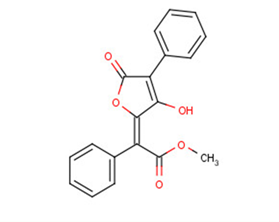
Vulpinic Acid
CAS No. 521-52-8
Vulpinic Acid( —— )
Catalog No. M17532 CAS No. 521-52-8
Vulpinic Acid is a lichen metabolite with anti-inflammatory, antibacteria, properties, plant growth inhibitor.
Purity : >98% (HPLC)
 COA
COA
 Datasheet
Datasheet
 HNMR
HNMR
 HPLC
HPLC
 MSDS
MSDS
 Handing Instructions
Handing Instructions
| Size | Price / USD | Stock | Quantity |
| 5MG | 45 | In Stock |


|
| 10MG | 72 | In Stock |


|
| 25MG | 115 | In Stock |


|
| 50MG | 174 | In Stock |


|
| 100MG | 258 | In Stock |


|
| 200MG | Get Quote | In Stock |


|
| 500MG | Get Quote | In Stock |


|
| 1G | Get Quote | In Stock |


|
Biological Information
-
Product NameVulpinic Acid
-
NoteResearch use only, not for human use.
-
Brief DescriptionVulpinic Acid is a lichen metabolite with anti-inflammatory, antibacteria, properties, plant growth inhibitor.
-
DescriptionVulpinic Acid is a lichen metabolite with anti-inflammatory, antibacteria, properties, plant growth inhibitor.
-
In Vitro——
-
In Vivo——
-
Synonyms——
-
PathwayCell Cycle/DNA Damage
-
TargetDNA/RNA Synthesis
-
RecptorOthers
-
Research Area——
-
Indication——
Chemical Information
-
CAS Number521-52-8
-
Formula Weight322.32
-
Molecular FormulaC19H14O5
-
Purity>98% (HPLC)
-
SolubilityIn Vitro:?DMSO : 25 mg/mL (77.57 mM)
-
SMILESCOC(=O)/C(=C/1\C(=C(C(=O)O1)c1ccccc1)O)/c1ccccc1
-
Chemical Name——
Shipping & Storage Information
-
Storage(-20℃)
-
ShippingWith Ice Pack
-
Stability≥ 2 years
Reference
1. Koparal AT., et at. Anti-angiogenic and antiproliferative properties of the lichen substances (-)-usnic acid and vulpinic acid. Z Naturforsch C. 2015;70(5-6):159-64.
molnova catalog



related products
-
T863
T-863(DGAT-1 inhibitor) is an orally active, selective and potent DGAT1 (Acyl-CoA:diacylglycerol acyltransferase 1) inhibitor that interacts with the acyl-CoA binding site of DGAT1, and inhibits triacylglycerol synthesis in cells.
-
1,4-Dideoxy-1,4-epit...
1,4-Dideoxy-1,4-epithio-D-ribitol is a purine nucleoside analog that targets malignant tumors of the inert lymphatic system and possesses a broad spectrum of antitumor activity.1,4-Dideoxy-1,4-epithio-D-ribitol induces apoptosis through inhibition of DNA synthesis.
-
SR 11302
SR 11302 is an inhibitor of activator protein-1 (AP-1).



 Cart
Cart
 sales@molnova.com
sales@molnova.com


